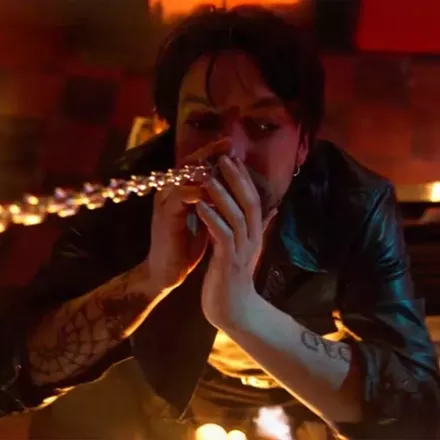Divine Plan
Eternals tries to get philosophical about God, but gets caught in the Marvel machine.
By Scott Renshaw @scottrenshawThe central characters of Eternals have existed on earth for 7,000 years—which feels like approximately how long the Marvel Cinematic Universe has dominated popular culture. Superheroes are the center of our modern mythology, something comic-book icon Jack Kirby recognized as far back as the 1970s, when he created The Eternals with a history that had them serving as the inspiration for the gods and heroes of ancient legend. And while this movie's characters existed long before the MCU, Eternals feels like a natural next step in its evolution, launching with an "In the beginning ..." prologue that effectively turns comic-book characters not into creations of humanity, but the creators of humanity. All bow before them!
The narrative of Eternals is a dense, centuries-spanning affair, built on the notion of a Celestial creator called Arishem, a bunch of monstrous creations called Deviants who have threaten humans from our prehistory, and a group of Eternals sent by Arishem to protect humanity from those Deviants. The central story takes place in our present, however, as Eternals remain scattered across the globe centuries after they believe they've eradicated the last of the Deviants, only to have one of them appear in London and attack the Eternals Sersi (Gemma Chan) and Sprite (Lia McHugh). That leads to a journey to get the band back together, and figure out how the unexpected attack connects with the Eternals' mission on earth.
There's certainly the potential for a lot of entertainment value in finding out how the various powerful, immortal beings have decided to spend their copious time among normal humans, but that's just one of the places that the script misses an opportunity. There are 10 Eternals in all, and since every one of them is being introduced in this movie for the first time, it's not easy for the screenplay to find time to flesh all of them out, even over more than 150 minutes; the existential angst of Sprite over her perpetual adolescence was taken more seriously when it was the undead Claudia in Interview with the Vampire. While Kingo (Kumail Nanjiani) carves out a place as a Bollywood movie star, and technology-manipulating Phastos (Brian Tyree Henry) enjoys domestic bliss with his husband and son, most of the team generally seems to be spending eternity in isolation—which makes it a bit hard to understand why some of them feel connected enough to humanity to still want to risk their own existence in order to save it.
That turns out to be part of the central moral conundrum in Eternals, as the team members learn the details of Arishem's grand design, and must decide whether their creator is deserving of their continued service, even when they believe his plans might be unconscionable. It's a weighty notion, similar to the one that fueled Michael Tolkin's remarkable 1991 drama The Rapture, and the significant amount of screen time spent on hashing out these philosophical questions would seem to make Chloé Zhao (last year's Oscar-winner for the contemplative Nomadland) a solid choice as director. There are moments when her own style shines through—it often seems that one of the unspoken powers of Ikaris (Richard Madden) is his ability to position himself so that his head is directly in front of the sun—but she also needs to carve out time for big battles with the CGI Deviants, lest the audience grow restless waiting through a cinematic debate of Plato's "Euthyphro dilemma." While there's ambition here, there's no way it was every going to be allowed to get in the way of the formula.
Not surprisingly, that formula also includes setting up down-the-line franchise installments, including the various mid- and post-credits scenes that will at least explain to the non-comic-book fans why Kit Harrington gets only, like, five minutes of screen time in Eternals. It seems impossible at this point for individual Marvel movies to resonate with serious dramatic ideas—or even the diversity represented in the Eternals team itself—given their place in the ongoing saga, which makes it a bummer when any individual chapter isn't even all that much fun along the way. Eternals re-frames the nature of existence and asks us to disconnect notions of the good from dictates by the all-powerful entity. When that all-powerful entity is Marvel Studios boss Kevin Feige, however, nobody yet has gotten to diverge from the master plan.
More by Scott Renshaw
-
Film Reviews: New Releases for May 23
Lilo & Stitch, Mission: Impossible - The Final Reckoning, Friendship, Fountain of Youth, The Last Rodeo
- May 22, 2025
-
Movie review: MISSION: IMPOSSIBLE – THE FINAL RECKONING
The series' swan song spends a bit too much time reminding us of its hero's significance.
- May 21, 2025
-
Film Reviews: New Releases for May 16
Final Destination Bloodlines, Hurry Up Tomorrow, Deaf President Now!
- May 15, 2025
- More »
Latest in Film Reviews
Readers also liked…
-
Sundance 2025 wrap-up plus February special screenings
Uncertainty about the future location shifts focus away from the movies
- Feb 5, 2025








